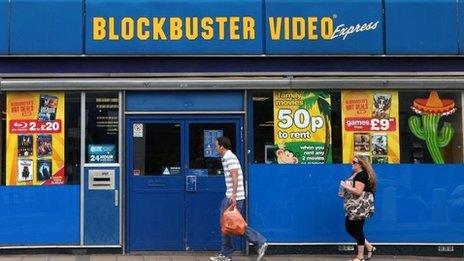Blockbuster goes into administration
- Published
- comments

Blockbusters has closed some branches in the past few years
DVD rental firm Blockbuster has become the latest UK High Street firm to go into administration after struggling against online competitors.
The chain has 528 stores and employs 4,190 staff.
Deloitte, the accountancy firm which will now take over running the firm, said Blockbuster UK would keep trading while it tries to find a buyer.
Music chain HMV and camera-seller Jessops both went into administration earlier this month.
"We are working closely with [Blockbuster UK's] suppliers and employees to ensure the business has the best possible platform to secure a sale, preserve jobs and generate as much value as possible for all creditors," said Lee Manning, from Deloitte's Restructuring Services practice.
"The core of the business is still profitable and we will continue to trade as normal in both retail and rental whilst we seek a buyer for all or parts of the business as a going concern.
"During this time gift cards and credit acquired through Blockbuster's trade-in scheme will be honoured towards the purchase of goods."
Many people were unhappy with the administrators' decision not to accept HMV gift vouchers, some of which had been given as Christmas presents.
It is not yet known what will happen to HMV's branches and 4,350 staff. Unusually, all of Jessops' 187 branches closed within days of administrators being appointed.
In the run up to Christmas, electricals retailer Comet collapsed and shoe chain Stead and Simpson announced it was closing 90 stores.
The Local Data Company which monitors the number of empty shops, said the recent failures added up to the worst period for the High Street it has seen.
"The administration and potential closure of over 1,400 stores in less than a month far surpasses Woolworths' 807 in January 2009," said director Matthew Hopkinson.
"This has the potential to increase the national shop vacancy rate by nearly 5% to an all time high of over 19% if all the stores close and are not reoccupied.
"The big question is how many more retailers are struggling out there to the point of administration?" he said.
Store closures
The first Blockbuster store in the UK opened in south London in 1989, and the firm has sought to expand its services in recent years, including with a trade-in facility for pre-owned titles.
The firm launched an online DVD rental operation in 2002, and the company's website, blockbuster.co.uk, claims to send out more discs per customer than other online DVD rental services in the UK.
However, this online rental market became increasingly crowded with rival services, and now the popularity of streaming films over the internet is growing fast.
Blockbuster UK has closed more than 100 outlets in the past few years.
Blockbuster went bankrupt in the US in 2011, but was rescued by US pay-TV provider Dish Network in a $320m (£200m) deal, which saved hundreds of US stores from closing. The UK arm is also owned by Dish Network and run separately.
Before Blockbuster was bought by Dish Network, there were media reports of ambitious expansion plans, including selling electrical goods such as televisions, mobile phones, and iPods.
But business experts said Blockbuster's problems were all too similar to those hitting other retailers - failure to adapt quickly enough to a changing business environment and consumer habits.
'Altered landscape'
Professor Ajay Bhalla, of Cass Business School, said: "The company, like HMV, failed to transform its business model early enough. When it did, it found a fundamentally altered competitive landscape where the platform model had destroyed the traditional retail one.
"Firms like Blockbuster failed to face up to the enormity of the change and altered their business model on the fringes (eg selling second-hand products), rather than coming up with an innovative offering. It is shocking that the board and executive management failed to make bold choices."
Dr Steve Musson, a lecturer at the University of Reading and an expert in the economics of UK cities, added: "The retail businesses that we have seen going into administration since Christmas have a lot in common - they have large numbers of stores and have struggled to adapt to changing retail habits.
"Rents for retail businesses are usually payable quarterly, with many landlords most recently asking for payment at the end of December, which is why we often see retail failures coming in clusters."
- Published13 February 2013
- Published15 January 2013
- Published21 January 2013
- Published15 January 2013